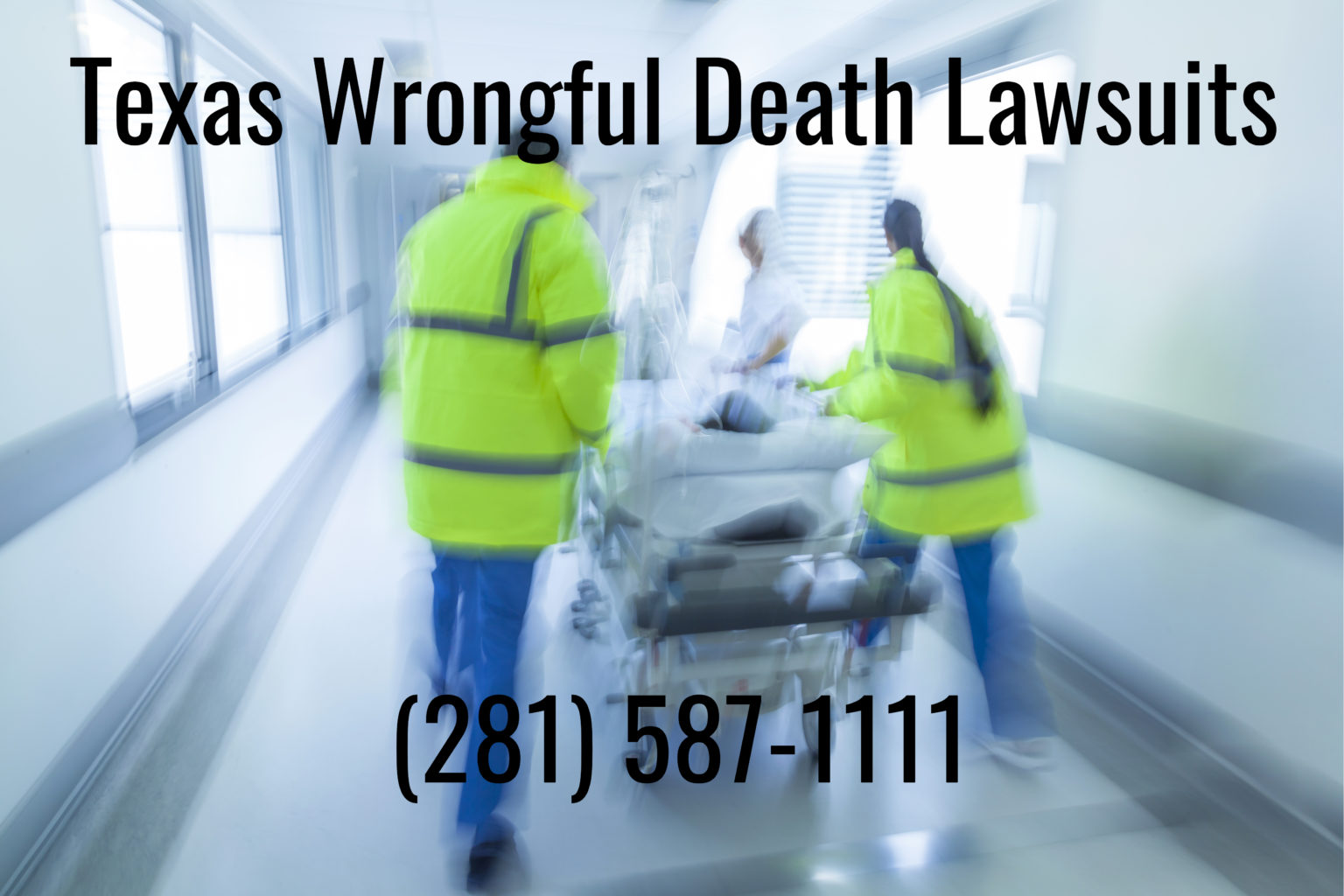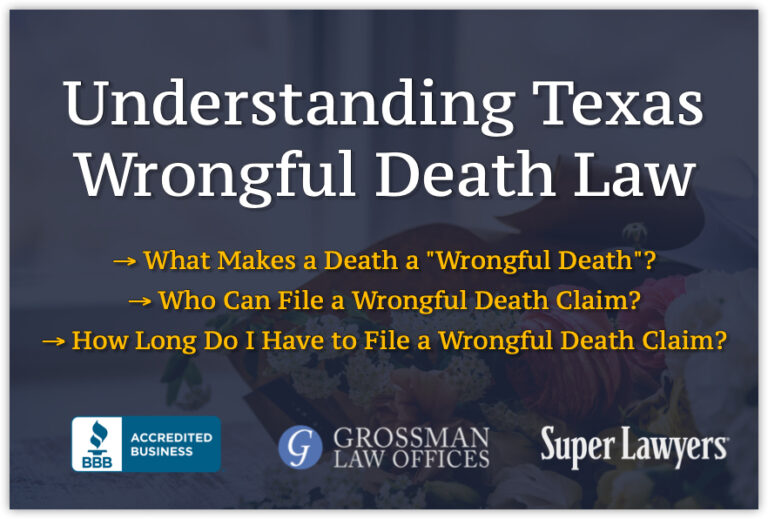As the esteemed texas wrongful death lawyer takes center stage, this opening passage beckons readers with a personal blog style into a world crafted with good knowledge, ensuring a reading experience that is both absorbing and distinctly original. Delve into the intricate legal landscape of wrongful death in Texas, where justice and empathy intertwine, shaping the course of this poignant exploration.
The content of the second paragraph that provides descriptive and clear information about the topic
Overview of Wrongful Death Law in Texas
Wrongful death is a civil cause of action that allows the family members of a person who has been killed due to the negligence or intentional act of another person or entity to seek compensation for their loss. The legal definition of wrongful death in Texas is found in the Texas Civil Practice and Remedies Code, Chapter 71.
To prove a wrongful death case, the plaintiff must prove the following elements:
- The defendant owed a duty of care to the deceased.
- The defendant breached that duty of care.
- The defendant’s breach of duty caused the death of the deceased.
- The plaintiff has suffered damages as a result of the deceased’s death.
Common causes of wrongful death in Texas include:
- Car accidents
- Medical malpractice
- Workplace accidents
- Product liability
- Premises liability
Selecting a Texas Wrongful Death Lawyer
Losing a loved one due to wrongful death is a devastating experience. Choosing the right attorney to represent you during this difficult time is crucial. Here are some tips to help you find a qualified and experienced wrongful death lawyer in Texas:
Consider the following factors when evaluating potential lawyers:
- Experience:Look for an attorney who has extensive experience handling wrongful death cases in Texas.
- Track Record:Inquire about the lawyer’s success rate in obtaining favorable outcomes for their clients.
- Reputation:Check online reviews and ask for referrals from other attorneys or clients.
- Fees:Discuss the attorney’s fees and payment structure upfront to avoid any surprises.
- Communication:Choose an attorney who is responsive, easy to reach, and provides regular updates on your case.
- Trust:It’s important to establish a strong attorney-client relationship built on trust and mutual respect.
Remember, selecting a wrongful death lawyer is a personal decision. Take your time, interview multiple attorneys, and choose the one who you believe will best represent your interests and help you obtain justice for your loved one.
Damages Recoverable in Texas Wrongful Death Cases
In Texas, the surviving family members of a person who has died due to someone else’s negligence or intentional act can file a wrongful death lawsuit. If successful, the family may be awarded damages to compensate them for their losses.
The types of damages that can be recovered in a Texas wrongful death case include:
The amount of damages awarded in a wrongful death case can vary depending on the specific circumstances of the case. Factors that can affect the amount of damages awarded include:
- The severity of the victim’s injuries
- The victim’s age and life expectancy
- The victim’s earning capacity
- The victim’s relationship with the surviving family members
- The defendant’s degree of fault
It is important to note that damages in a wrongful death case are not intended to punish the defendant. Instead, they are meant to compensate the surviving family members for their losses. The goal of wrongful death damages is to make the surviving family members whole again, to the extent that is possible.
Economic Damages
- Medical and funeral expenses
- Lost income and benefits
- Loss of inheritance
- Loss of household services
Non-Economic Damages
- Pain and suffering
- Mental anguish
- Loss of companionship
- Loss of consortium
Punitive Damages, Texas wrongful death lawyer
In some cases, the court may also award punitive damages. Punitive damages are intended to punish the defendant for particularly egregious conduct and to deter others from engaging in similar conduct in the future.
The Wrongful Death Statute of Limitations in Texas
The Texas statute of limitations for filing a wrongful death lawsuit is two years from the date of the person’s death. This means that you must file your lawsuit within two years of the date of death, or you will lose your right to sue.There are a few exceptions to the statute of limitations.
One exception is if the person who caused the death is a government entity. In this case, you have six months to file your lawsuit. Another exception is if the person who caused the death is out of state. In this case, you have two years from the date the person returns to Texas to file your lawsuit.If you fail to file your wrongful death lawsuit within the statute of limitations, you will lose your right to sue.
This means that you will not be able to recover any damages for the death of your loved one.
Trial Process for Wrongful Death Cases in Texas
Wrongful death trials in Texas follow a structured process to determine liability and damages. Understanding the steps involved can help you navigate the legal process effectively.
If you’ve lost a loved one in a wrongful death, it’s crucial to seek legal representation from an experienced Texas wrongful death lawyer. These attorneys specialize in handling cases involving the wrongful death of a family member and can guide you through the legal process.
In addition, you may also consider consulting with top rated car accident lawyers near me if the wrongful death was caused by a car accident. By seeking professional legal assistance, you can ensure that your rights are protected and that you receive fair compensation for your loss.
Steps Involved in a Wrongful Death Trial
The trial process typically includes the following steps:
Jury Selection
A jury is selected to hear the case and render a verdict based on the evidence presented.
Opening Statements
Attorneys for both sides present their opening statements, outlining their case and arguments.
Presentation of Evidence
Evidence is presented through witnesses, documents, and other exhibits to support each side’s claims.
Cross-Examination
Attorneys have the opportunity to cross-examine witnesses to challenge their testimony.
Closing Arguments
Losing a loved one is never easy, especially if their death was caused by someone else’s negligence. If you’re facing this situation, you may be eligible for compensation through a wrongful death lawsuit. In Texas, wrongful death lawyers can help you navigate the legal process and fight for your rights.
They can also guide you through the complexities of workers comp insurance and other related matters, ensuring that you receive the maximum compensation you deserve.
Attorneys present their closing arguments, summarizing the evidence and urging the jury to rule in their favor.
Jury Deliberation
If you have lost a loved one due to the negligence of another, it’s crucial to seek legal representation from an experienced texas wrongful death lawyer. Their expertise can help you navigate the complexities of the legal process and ensure that you receive the compensation you deserve.
Additionally, if you have been involved in an auto collision, it’s essential to contact an auto collision attorney near me to protect your rights. These specialized attorneys can assist you in obtaining fair compensation for your injuries and damages. Moreover, a texas wrongful death lawyer can provide invaluable guidance and support throughout your legal journey, ensuring that justice is served.
The jury retires to deliberate and reach a verdict on liability and damages.
Verdict
The jury returns a verdict, which can include findings of negligence, damages awarded, and apportionment of fault.
Roles of the Judge, Jury, and Attorneys
Judge
Presides over the trial, ensures fairness, rules on legal issues, and instructs the jury on the law.
Jury
Determines the facts of the case, assesses the evidence, and renders a verdict based on the instructions from the judge.
Attorneys
Represent their clients, present evidence, cross-examine witnesses, and argue their case before the jury.
Evidence and Arguments
Evidence presented in wrongful death trials can include medical records, accident reports, expert testimony, and witness statements. Attorneys use these to establish negligence, liability, and damages. They present their arguments through opening statements, cross-examination, and closing arguments, aiming to persuade the jury to support their claims.
Settling a Wrongful Death Case in Texas
After a wrongful death, the surviving family members may choose to file a lawsuit to seek compensation for their loss. However, many wrongful death cases are settled before going to trial. Settling a case can have both advantages and disadvantages.
Advantages of Settling a Wrongful Death Case
- Quicker resolution:Settling a case can take less time than going to trial, which can provide the family with closure and financial compensation more quickly.
- Lower costs:Settling a case can be less expensive than going to trial, as it avoids the costs of a trial, such as expert witness fees and attorney fees.
- Confidentiality:The terms of a settlement are typically confidential, which can protect the family’s privacy.
- Guaranteed outcome:Settling a case provides a guaranteed outcome, whereas going to trial involves the risk of losing the case or receiving a lower award.
Disadvantages of Settling a Wrongful Death Case
- Lower settlement amount:Settlements are often lower than the amount that could be awarded by a jury at trial.
- Waiver of rights:By settling a case, the family waives their right to pursue further legal action against the defendant.
- Lack of closure:Settling a case without going to trial may not provide the family with the same sense of closure as a trial.
Negotiation Process Involved in Settlement
The negotiation process in a wrongful death settlement involves several steps:
- Initial demand:The family’s attorney will send a demand letter to the defendant’s insurance company, outlining the damages they are seeking.
- Insurance company response:The insurance company will review the demand and make an offer to settle.
- Negotiation:The family’s attorney and the insurance company will negotiate back and forth until they reach an agreement.
- Settlement agreement:Once an agreement is reached, a settlement agreement will be drafted and signed by both parties.
Tips for Maximizing the Settlement Amount
- Hire an experienced attorney:An experienced wrongful death attorney will know how to negotiate the best possible settlement for your family.
- Document your damages:Keep track of all expenses related to the wrongful death, such as medical bills, funeral costs, and lost income.
- Be prepared to negotiate:Be prepared to negotiate with the insurance company and do not accept the first offer they make.
- Consider mediation:If you are unable to reach a settlement agreement through negotiation, you may consider mediation, which involves a neutral third party helping to facilitate a settlement.
Summary
The content of the concluding paragraph that provides a summary and last thoughts in an engaging manner
Query Resolution: Texas Wrongful Death Lawyer
What is the legal definition of wrongful death in Texas?
Wrongful death is a civil cause of action brought by the family members of a person who has died due to the negligence or intentional act of another person or entity.
What are the elements that must be proven in a wrongful death case?
The plaintiff must prove that the defendant owed a duty of care to the deceased, that the defendant breached that duty, that the breach of duty was the cause of the deceased’s death, and that the plaintiff suffered damages as a result of the death.
What are the common causes of wrongful death in Texas?
Common causes of wrongful death in Texas include car accidents, medical malpractice, product liability, and workplace accidents.






